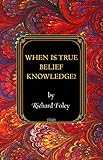When is true belief knowledge? / Richard Foley.
Material type: TextSeries: Princeton monographs in philosophyPublication details: Princeton : Princeton University Press, ©2012.Description: 1 online resource (viii, 153 pages)Content type:
TextSeries: Princeton monographs in philosophyPublication details: Princeton : Princeton University Press, ©2012.Description: 1 online resource (viii, 153 pages)Content type: - text
- computer
- online resource
- 9781400842308
- 1400842301
- 121 23
- BD215 .F587 2012eb
| Item type | Home library | Collection | Call number | Materials specified | Status | Date due | Barcode | |
|---|---|---|---|---|---|---|---|---|
 Electronic-Books
Electronic-Books
|
OPJGU Sonepat- Campus | E-Books EBSCO | Available |
Includes bibliographical references (pages 137-148) and index.
An observation -- Post-gettier accounts of knowledge -- Knowledge stories -- Intuitions about knowledge -- Important truths -- Maximally accurate and comprehensive beliefs -- The beetle in the box -- Knowledge blocks -- The theory of knowledge and theory of justified belief -- The value of true belief -- The value of knowledge -- The lottery and preface -- Reverse lottery stories -- Lucky knowledge -- Closure and skepticism -- Disjunctions -- Fixedness and knowledge -- Instability and knowledge -- Misleading defeaters -- Believing that I don't know -- Introspective knowledge -- Perceptual knowledge -- A priori knowledge -- Collective knowledge -- A look back -- Epistemology within a general theory of rationality -- The core concepts of epistemology.
A woman glances at a broken clock and comes to believe it is a quarter past seven. Yet, despite the broken clock, it really does happen to be a quarter past seven. Her belief is true, but it isn't knowledge. This is a classic illustration of a central problem in epistemology: determining what knowledge requires in addition to true belief. In this provocative book, Richard Foley finds a new solution to the problem in the observation that whenever someone has a true belief but not knowledge, there is some significant aspect of the situation about which she lacks true beliefs--something important that she doesn't quite "get." This may seem a modest point but, as Foley shows, it has the potential to reorient the theory of knowledge. Whether a true belief counts as knowledge depends on the importance of the information one does or doesn't have. This means that questions of knowledge cannot be separated from questions about human concerns and values. It also means that, contrary to what is often thought, there is no privileged way of coming to know. Knowledge is a mutt. Proper pedigree is not required. What matters is that one doesn't lack important nearby information
Print version record.
eBooks on EBSCOhost EBSCO eBook Subscription Academic Collection - Worldwide
There are no comments on this title.

